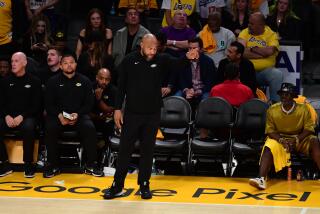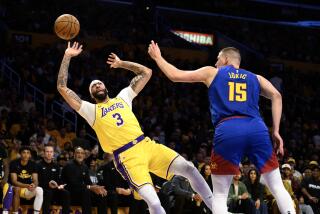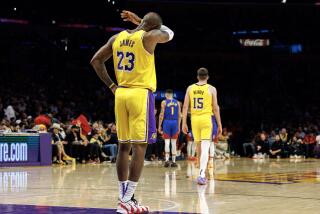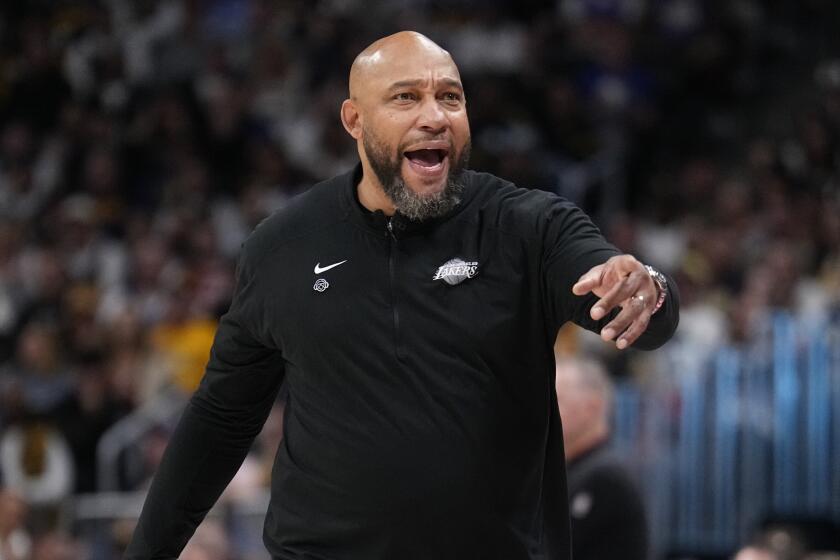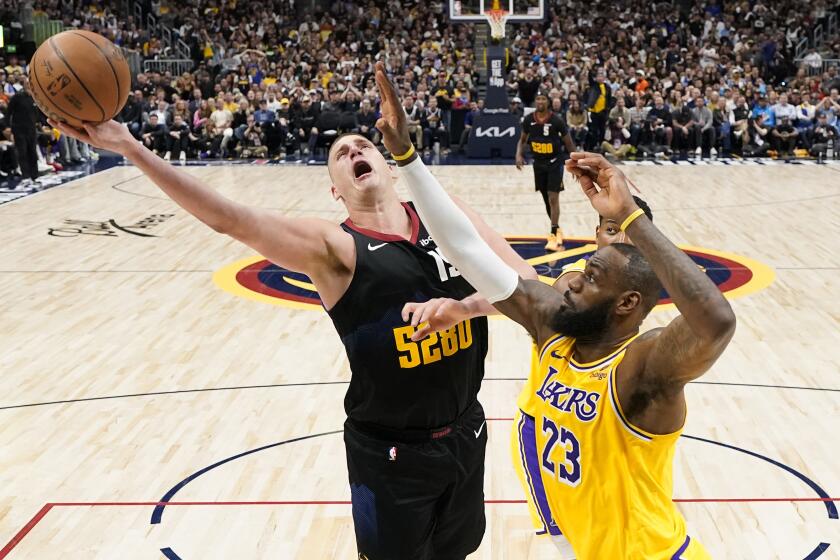Lakers Having Money Troubles
Mitch Kupchak is hoping for an exceptional summer.
The Laker general manager stepped into the free-agent market this week armed with only the mid-level exception to offer players, hoping for that rarest of exceptions: the guy who actually means it when he says he values a championship over everything else.
The off-season actions of NBA players repeatedly show that it’s a league that values dollars over diamonds, cha-ching over bling-bling.
When Shaquille O’Neal came to town with that seven-year, $125-million contract in 1996, the Lakers immediately vaulted into championship contention and salary-cap constraints. If rings were all that mattered, the Lakers would have free agents calling them. Instead, the Lakers of recent years have had to make do with everything from the old (A.C. Green and John Salley) to the odd (Dennis Rodman and Isaiah Rider).
That’s why, early on in the process, the smart money’s on the money -- and not the Lakers -- when it comes to luring the top-tier free agents.
Players still capable of matching their best seasons, such as point guard Gary Payton and power forwards P.J. Brown and Juwan Howard, can still command more than the $4.9-million mid-level exception the Lakers have to offer.
Sun, sand, Staples Center and shots at championships won’t cut it. One associate of a Laker free-agent target has already said he was put off by the Lakers’ attitude that it’s a privilege to play for them.
Kupchak wouldn’t talk about specific names when he discussed free agents Wednesday, the same day the Lakers introduced draft picks Brian Cook and Luke Walton to the media.
But he did talk about the prevailing attitude given the opportunity to make $2 million, $3 million or more per year somewhere else.
“If [the money’s] close, they want to win,” Kupchak said. “If it’s a large discrepancy, then of course not. The real world doesn’t provide for us to make that kind of money. You have to do it while you can.
“That’s natural. This kind of money is not real-world money. You really have to do the best you can to finance yourself.”
One hope for the Lakers is to coast in on the largesse of the free-spending summer of 1996. That was the boom year, right in line with the dot-com-crazy stock market. With several teams flush with cash and without the threat of a luxury tax, salaries skyrocketed. Now the seven-year deals (the maximum allowed) signed that summer have expired.
“Some of these guys have made a lot of money and they’ve saved it,” Kupchak said. “I think they’ll make a decision based on wins -- quality of life and winning....
“There may be a couple of guys like that. A couple.”
Two in particular would be Howard and Payton, two of the biggest winners in 1996. Howard roped in a $105-million contract and Payton signed an $85-million contract.
They won’t get that type of money again. But perhaps Denver would be willing to spend a little bit to keep Howard in town with first-round draft pick Carmelo Anthony and potential free-agent signee Gilbert Arenas. And Milwaukee owner Herb Kohl, eager to show he’s serious about the Bucks after rebuffing an offer from Michael Jordan to buy the team, ponies up to bring back Payton.
Either of those scenarios seems more likely than their signing with the Lakers.
Remember a couple of years ago when Kendall Gill -- Kendall Gill -- passed up a chance to play with the Lakers to take $7 million from the (pre-Jason Kidd) New Jersey Nets?
Only once have the Lakers had a viable free agent come to town for less than market value, and that was six years ago.
Rick Fox, fresh off a career-high 15.4-points-per-game season with the Boston Celtics, signed with the Lakers for $1 million. He had better offers, including $5 million a year from the Cleveland Cavaliers. But he came to L.A. for less cash.
“He made a decision that was just a little bit different than most people,” Kupchak said. “That’s very unlikely, but you never know. You could get one guy like that. It happened once. It worked out for Rick.”
He got a slight raise the next season, but the payoff began in August 1999. That’s when he signed a six-year, $24-million contract, then embarked on the first of three championship seasons.
“I couldn’t tell him it was the right thing to do,” Kupchak said. “I said, ‘Rick, do you know what you’re doing here?’ He said, ‘Yeah, I know. But I need a change. I need to get out of Boston. I need to get my mind back on something that’s important.’ ”
Maybe, just maybe, there’s another guy with Fox’s mentality out there.
One avenue for the Lakers would be to offer a longer contract than another team, particularly for slightly older players such as Payton (35 on July 23) or Brown (34). Then they run the risk of getting stuck with a diminished player down the road.
The collective bargaining agreement prevents them from offering more than three or four years to a player over 36, which could factor in with Karl Malone.
“You really can’t get creative,” Kupchak said. “ You just kind of offer what you can. You hope whatever else you have to bring to the table either offsets two equal bids, or if there’s a little bit more, the chance to win and live in Los Angeles, those things can happen.”
So Kupchak keeps his cell phone charged. The other night he was in the backyard, watching the kids play in the pool, when a player agent called.
“Put your clothes on!” Kupchak yelled -- at his daughter, not the agent.
But maybe his time with the kids will prove to be less frustrating. At least they don’t put the money first.
J.A. Adande can be reached at j.a.adande@latimes.com.
More to Read
All things Lakers, all the time.
Get all the Lakers news you need in Dan Woike's weekly newsletter.
You may occasionally receive promotional content from the Los Angeles Times.
